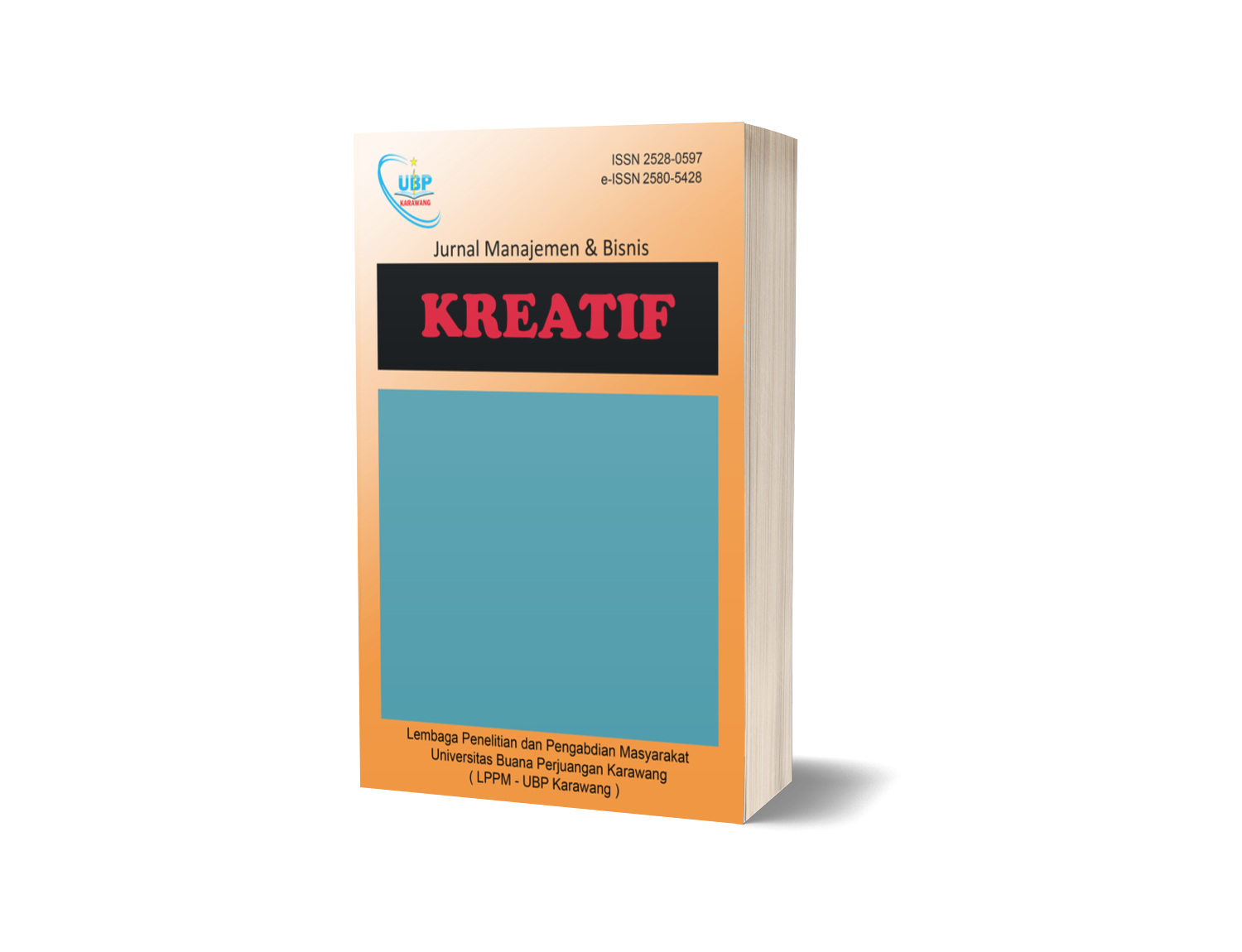Aspek Perilaku Dalam Overconfidence: Analysis Bibliometric
Manajemen Keuangan
DOI:
https://doi.org/10.36805/manajemen.v10i1.8011Keywords:
Overconfidence, Analysis Bibliometrik, Behaviour FinanceAbstract
ABSTRACT
Abstract This research aims to conduct a bibliometric analysis of bias overconfidence published from 2017 to 2023. The Crossref database is used to gather information on studies related to overconfidence. A total of 2105 articles have been collected with the keyword "overconfidence". This paper analyzes publication trends and evaluates publication performance through mapping and scientific analysis. The study also identifies the contributions of authors, journals, countries, keywords, and articles using bibliometric analysis. The study suggests that the self-confidence levels of experts can reflect their potential behaviors or attitudes in decision-making and can have a significant influence on the final decision. An overconfidence measurement is presented to detect and manage the overconfidence behaviors of decision-makers in achieving consensus.
ABSTRAK
Abstrak: Penelitian ini bertujuan untuk melakukan analisis bibliometrik tentang biar overconfidence yang diterbitkan dari tahun 2017 hingga 2023. Database Crossref digunakan untuk mengumpulkan informasi mengenai studi yang berkaitan dengan overconfidence. Sebanyak 2105 artikel telah dikumpulkan dengan kata kunci overconfidence. Makalah ini menganalisis tren publikasi dan mengevaluasi kinerja publikasi melalui pemetaan dan analisis ilmiah. Penelitian ini juga mengidentifikasi kontribusi penulis, jurnal, negara, kata kunci, dan artikel menggunakan analisis bibliometrik. Penelitian ini menyiratkan bahwa tingkat kepercayaan diri para ahli dapat mencerminkan perilaku atau sikap potensial mereka dalam pengambilan keputusan dan dapat memiliki pengaruh signifikan pada keputusan akhir. Pengukuran kelebihan kepercayaan diri disajikan untuk mendeteksi dan mengelola perilaku kelebihan kepercayaan diri dari para pengambil keputusan dalam mencapai konsensus.
Downloads
References
Aljifri, R. (2023). Investor psychology in the stock market: An empirical study of the impact of overconfidence on firm valuation. Borsa Istanbul Review, 23(1), 93–112. https://doi.org/10.1016/j.bir.2022.09.010
Jarboui, A., & Souissi, Y. (2023). Exploring the relationship between managerial overconfidence and investment efficiency in the US hospitality industry. In International Journal of Services, Economics and Management (Vol. 1, Issue 1, p. 1). Inderscience Publishers. https://doi.org/10.1504/ijsem.2023.10055939
Jin, S. H., & Joo, S.-H. (2022). Stock Investment Behaviors of 2030s: The Effects of Overconfidence, Financial Risk Tolerance on Trading Frequency, Return Rate and Investment Satisfaction. In Journal of Consumer Studies (Vol. 33, Issue 3, pp. 93–116). Korean Society of Consumer Studies. https://doi.org/10.35736/jcs.33.3.5
Kerem, K., & Chatain, O. (2019). CEO Overconfidence and Relative Performance Evaluation. In Academy of Management Proceedings (Vol. 2019, Issue 1, p. 18850). Academy of Management. https://doi.org/10.5465/ambpp.2019.18850abstract
Liang, Q., Ling, L., Tang, J., Zeng, H., & Zhuang, M. (2019). Managerial overconfidence, firm transparency, and stock price crash risk. In China Finance Review International (Vol. 10, Issue 3, pp. 271–296). Emerald. https://doi.org/10.1108/cfri-01-2019-0007
Parveen, S., Satti, Z. W., Subhan, Q. A., & Jamil, S. (2020). Exploring market overreaction, investors’ sentiments and investment decisions in an emerging stock market. Borsa Istanbul Review, 20(3), 224–235. https://doi.org/10.1016/j.bir.2020.02.002
Pinaring, L., Yuniningsih, Y., & Wikartika, I. (2023). Effect of Financial Literacy, Risk Tolerance, and Overconfidence on Sandwich Generation Investment Decisions in the City of Surabaya. In International Journal of Multidisciplinary Research and Analysis (Vol. 6, Issue 4). Everant Journals. https://doi.org/10.47191/ijmra/v6-i4-40
V, D. S., Saha, S., Ghosh, R., Ghosh, R., & Misra, D. S. (2019). Overconfidence versus Herd Mentality Bias: An Investment Decision. In International Journal of Psychosocial Rehabilitation (Vol. 23, Issue 3, pp. 957–978). Hampstead Psychological Associates. https://doi.org/10.37200/ijpr/v23i3/pr190382
Aljifri, R. (2023). Investor psychology in the stock market: An empirical study of the impact of overconfidence on firm valuation. Borsa Istanbul Review, 23(1), 93–112. https://doi.org/10.1016/j.bir.2022.09.010
Jarboui, A., & Souissi, Y. (2023). Exploring the relationship between managerial overconfidence and investment efficiency in the US hospitality industry. In International Journal of Services, Economics and Management (Vol. 1, Issue 1, p. 1). Inderscience Publishers. https://doi.org/10.1504/ijsem.2023.10055939
Jin, S. H., & Joo, S.-H. (2022). Stock Investment Behaviors of 2030s: The Effects of Overconfidence, Financial Risk Tolerance on Trading Frequency, Return Rate and Investment Satisfaction. In Journal of Consumer Studies (Vol. 33, Issue 3, pp. 93–116). Korean Society of Consumer Studies. https://doi.org/10.35736/jcs.33.3.5
Kerem, K., & Chatain, O. (2019). CEO Overconfidence and Relative Performance Evaluation. In Academy of Management Proceedings (Vol. 2019, Issue 1, p. 18850). Academy of Management. https://doi.org/10.5465/ambpp.2019.18850abstract
Liang, Q., Ling, L., Tang, J., Zeng, H., & Zhuang, M. (2019). Managerial overconfidence, firm transparency, and stock price crash risk. In China Finance Review International (Vol. 10, Issue 3, pp. 271–296). Emerald. https://doi.org/10.1108/cfri-01-2019-0007
Parveen, S., Satti, Z. W., Subhan, Q. A., & Jamil, S. (2020). Exploring market overreaction, investors’ sentiments and investment decisions in an emerging stock market. Borsa Istanbul Review, 20(3), 224–235. https://doi.org/10.1016/j.bir.2020.02.002
Pinaring, L., Yuniningsih, Y., & Wikartika, I. (2023). Effect of Financial Literacy, Risk Tolerance, and Overconfidence on Sandwich Generation Investment Decisions in the City of Surabaya. In International Journal of Multidisciplinary Research and Analysis (Vol. 6, Issue 4). Everant Journals. https://doi.org/10.47191/ijmra/v6-i4-40
V, D. S., Saha, S., Ghosh, R., Ghosh, R., & Misra, D. S. (2019). Overconfidence versus Herd Mentality Bias: An Investment Decision. In International Journal of Psychosocial Rehabilitation (Vol. 23, Issue 3, pp. 957–978). Hampstead Psychological Associates. https://doi.org/10.37200/ijpr/v23i3/pr190382
Downloads
Published
Issue
Section
License
Authors who publish in Jurnal Manajemen dan Bisnis Kreatif agree to the following terms:
- Authors retain copyright and grant the journal right of first publication with the work simultaneously licensed under a Attribution-ShareAlike 4.0 International (CC BY-SA 4.0) License that allows others to share the work with an acknowledgment of the work's authorship and initial publication in this journal.
- Authors are able to enter into separate, additional contractual arrangements for the non-exclusive distribution of the journal's published version of the work (e.g., post it to an institutional repository or publish it in a book), with an acknowledgment of its initial publication in this journal.
- Authors are permitted and encouraged to post their work online (e.g., in institutional repositories or on their website) prior to and during the submission process, as it can lead to productive exchanges, as well as earlier and greater citation of published work (See The Effect of Open Access).








